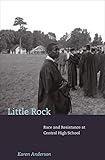Little Rock : Race and Resistance at Central High School / Karen Anderson.
Material type: TextSeries: Politics and Society in Modern America ; 96Publisher: Princeton, NJ : Princeton University Press, [2013]Copyright date: ©2010Edition: Course BookDescription: 1 online resource (344 p.) : 12 halftonesContent type:
TextSeries: Politics and Society in Modern America ; 96Publisher: Princeton, NJ : Princeton University Press, [2013]Copyright date: ©2010Edition: Course BookDescription: 1 online resource (344 p.) : 12 halftonesContent type: - 9780691159614
- 9781400832149
- African American students -- Arkansas -- Little Rock -- History -- 20th century
- African Americans -- Education -- Arkansas -- Little Rock -- History
- School integration -- Massive resistance movement -- Arkansas -- Little Rock -- History
- School integration -- Arkansas -- Little Rock -- History -- 20th century
- HISTORY / United States / 20th Century
- 379.2/630976773 22
- LC214.23.L56
- online - DeGruyter
- Issued also in print.
| Item type | Current library | Call number | URL | Status | Notes | Barcode | |
|---|---|---|---|---|---|---|---|
 eBook
eBook
|
Biblioteca "Angelicum" Pont. Univ. S.Tommaso d'Aquino Nuvola online | online - DeGruyter (Browse shelf(Opens below)) | Online access | Not for loan (Accesso limitato) | Accesso per gli utenti autorizzati / Access for authorized users | (dgr)9781400832149 |
Frontmatter -- Contents -- Illustrations -- Acknowledgments -- Introduction: Not Here, Not Now, Not Us -- 1. Mapping Change: Little Rock Forges a Desegregation Plan -- 2. "Occupied Arkansas": Class, Gender, and the Politics of Resistance -- 3. Uncivil Disobedience: The Politics of Race and Resistance at Central High School, 1957-1958 -- 4. The Politics of School Closure: Massive Resistance Put to the Test, 1958-1959 -- 5. The Politics of Fear and Gridlock -- 6. Politics as Usual: Reviving the Politics of Tokenism -- Conclusions: Little Rock and the Legacies of Brown v. Board of Education -- Abbreviations -- Notes -- Index
restricted access online access with authorization star
http://purl.org/coar/access_right/c_16ec
The desegregation crisis in Little Rock is a landmark of American history: on September 4, 1957, after the Supreme Court struck down racial segregation in public schools, Arkansas Governor Orval Faubus called up the National Guard to surround Little Rock Central High School, preventing black students from going in. On September 25, 1957, nine black students, escorted by federal troops, gained entrance. With grace and depth, Little Rock provides fresh perspectives on the individuals, especially the activists and policymakers, involved in these dramatic events. Looking at a wide variety of evidence and sources, Karen Anderson examines American racial politics in relation to changes in youth culture, sexuality, gender relations, and economics, and she locates the conflicts of Little Rock within the larger political and historical context. Anderson considers how white groups at the time, including middle class women and the working class, shaped American race and class relations. She documents white women's political mobilizations and, exploring political resentments, sexual fears, and religious affiliations, illuminates the reasons behind segregationists' missteps and blunders. Anderson explains how the business elite in Little Rock retained power in the face of opposition, and identifies the moral failures of business leaders and moderates who sought the appearance of federal compliance rather than actual racial justice, leaving behind a legacy of white flight, poor urban schools, and institutional racism. Probing the conflicts of school desegregation in the mid-century South, Little Rock casts new light on connections between social inequality and the culture wars of modern America.Some images inside the book are unavailable due to digital copyright restrictions.
Issued also in print.
Mode of access: Internet via World Wide Web.
In English.
Description based on online resource; title from PDF title page (publisher's Web site, viewed 29. Jul 2021)


